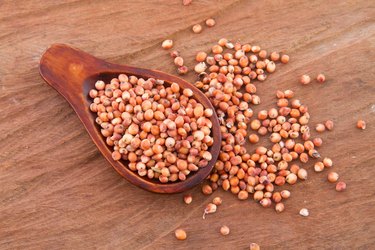
Sorghum, also known as "guinea corn," is a cereal grain that originated in Africa and is eaten worldwide. It is especially valuable in arid terrain because of its resistance to drought. Guinea corn is a nutrient-rich grain that is often ground into flour to make bread, porridge and pancakes.
The nutritional value of sorghum makes it a good addition to a healthy diet.
Video of the Day
Video of the Day
Read more: 10 Myths About Grains — Totally Busted
Guinea Corn Calories and Protein
A 1/4 cup serving of dry guinea corn contains 158 calories, according to the USDA. Compared to other grains, guinea corn contains about the same amount of calories. For example, a 1/4 cup serving of dry oat groats contains 142 calories; 1/4 cup of dry barley is 176 calories.
A 1/4 cup serving of guinea corn contains 5 grams of protein — the building blocks for all cells in the body. This equates to 9 percent of the recommended 56 grams per day for men and 11 percent of the recommended 46 grams for women, according to the National Academies of Sciences.
Count the Carbs and Fat
Most of the calories in guinea corn come from its carbohydrate content, making it a good source of energy. A 1/4 cup serving contains 35 grams of carbohydrates and 3 grams of fiber. Fiber is a type of carbohydrate that your body cannot digest, adding bulk to stool to improve bowel function. In addition, the fiber in the guinea corn can also decrease your risk of heart disease by decreasing blood cholesterol levels, according to Harvard School of Public Health. One serving of guinea corn meets 11 to 16 percent of your daily value for fiber.
Guinea corn is a low-fat food product, containing 1.7 grams of total fat, 0.3 grams of saturated fat, 0.5 grams monounsaturated fat and 0.8 grams of polyunsaturated fat per 1/4 cup serving. According to the American Heart Association, saturated fats should make up no more than 6 percent of your daily caloric intake — 13 grams for a 2,000 calorie diet.
Choosing more low-fat foods in your diet can help reduce your overall fat intake, lowering your risk of heart disease, certain types of cancers and obesity.
Read more: 13 Powerful Grains and Seeds
Meet Minerals in Guinea Corn
One nutritional highlight of guinea corn is its mineral content. A 1/4 cup serving contains:
- 6 milligrams of calcium
- 1.6 milligrams of iron
- 139 milligrams of phosphorus
- 174 milligrams of potassium
Calcium and phosphorus are essential minerals needed for bone health and strength. Adequate intakes of iron support the transportation of oxygen in your body, and help promote cell growth and development. Potassium helps maintain fluid balance, and high intakes improve blood pressure, according to the American Heart Association.
Guinea corn is naturally low in sodium, with only 1 milligram per 1/4 cup. The American Heart Association recommends that daily intake of sodium be less than 2,300 milligrams per day. This amount decreases to 1,500 milligrams if you have risk factors for heart disease.
- USDA National Nutrient Database: "Sorghum Grain"
- USDA National Nutrient Database: "Buckwheat Groats, Roasted Dry"
- USDA National Nutrient Database: "Barley, Pearled, Raw"
- National Academies of Sciences: "Macronutrients"
- Harvard School of Public Health: "Fiber"
- American Heart Association: "Saturated Fat"
- American Heart Association: "How Potassium Can Help Control High Blood Pressure"
- American Heart Association: "How Much Sodium Should I Eat Per Day?"